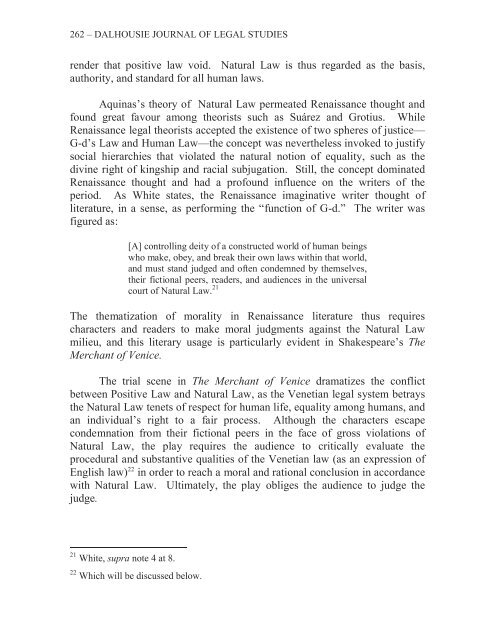(comic) tragedy of formalism in shakespeare's the ... - Goodmans
(comic) tragedy of formalism in shakespeare's the ... - Goodmans
(comic) tragedy of formalism in shakespeare's the ... - Goodmans
Create successful ePaper yourself
Turn your PDF publications into a flip-book with our unique Google optimized e-Paper software.
262 – DALHOUSIE JOURNAL OF LEGAL STUDIES<br />
render that positive law void. Natural Law is thus regarded as <strong>the</strong> basis,<br />
authority, and standard for all human laws.<br />
Aqu<strong>in</strong>as’s <strong>the</strong>ory <strong>of</strong> Natural Law permeated Renaissance thought and<br />
found great favour among <strong>the</strong>orists such as Suárez and Grotius. While<br />
Renaissance legal <strong>the</strong>orists accepted <strong>the</strong> existence <strong>of</strong> two spheres <strong>of</strong> justice—<br />
G-d’s Law and Human Law—<strong>the</strong> concept was never<strong>the</strong>less <strong>in</strong>voked to justify<br />
social hierarchies that violated <strong>the</strong> natural notion <strong>of</strong> equality, such as <strong>the</strong><br />
div<strong>in</strong>e right <strong>of</strong> k<strong>in</strong>gship and racial subjugation. Still, <strong>the</strong> concept dom<strong>in</strong>ated<br />
Renaissance thought and had a pr<strong>of</strong>ound <strong>in</strong>fluence on <strong>the</strong> writers <strong>of</strong> <strong>the</strong><br />
period. As White states, <strong>the</strong> Renaissance imag<strong>in</strong>ative writer thought <strong>of</strong><br />
literature, <strong>in</strong> a sense, as perform<strong>in</strong>g <strong>the</strong> “function <strong>of</strong> G-d.” The writer was<br />
figured as:<br />
[A] controll<strong>in</strong>g deity <strong>of</strong> a constructed world <strong>of</strong> human be<strong>in</strong>gs<br />
who make, obey, and break <strong>the</strong>ir own laws with<strong>in</strong> that world,<br />
and must stand judged and <strong>of</strong>ten condemned by <strong>the</strong>mselves,<br />
<strong>the</strong>ir fictional peers, readers, and audiences <strong>in</strong> <strong>the</strong> universal<br />
court <strong>of</strong> Natural Law. 21<br />
The <strong>the</strong>matization <strong>of</strong> morality <strong>in</strong> Renaissance literature thus requires<br />
characters and readers to make moral judgments aga<strong>in</strong>st <strong>the</strong> Natural Law<br />
milieu, and this literary usage is particularly evident <strong>in</strong> Shakespeare’s The<br />
Merchant <strong>of</strong> Venice.<br />
The trial scene <strong>in</strong> The Merchant <strong>of</strong> Venice dramatizes <strong>the</strong> conflict<br />
between Positive Law and Natural Law, as <strong>the</strong> Venetian legal system betrays<br />
<strong>the</strong> Natural Law tenets <strong>of</strong> respect for human life, equality among humans, and<br />
an <strong>in</strong>dividual’s right to a fair process. Although <strong>the</strong> characters escape<br />
condemnation from <strong>the</strong>ir fictional peers <strong>in</strong> <strong>the</strong> face <strong>of</strong> gross violations <strong>of</strong><br />
Natural Law, <strong>the</strong> play requires <strong>the</strong> audience to critically evaluate <strong>the</strong><br />
procedural and substantive qualities <strong>of</strong> <strong>the</strong> Venetian law (as an expression <strong>of</strong><br />
English law) 22 <strong>in</strong> order to reach a moral and rational conclusion <strong>in</strong> accordance<br />
with Natural Law. Ultimately, <strong>the</strong> play obliges <strong>the</strong> audience to judge <strong>the</strong><br />
judge.<br />
21 White, supra note 4 at 8.<br />
22 Which will be discussed below.
















